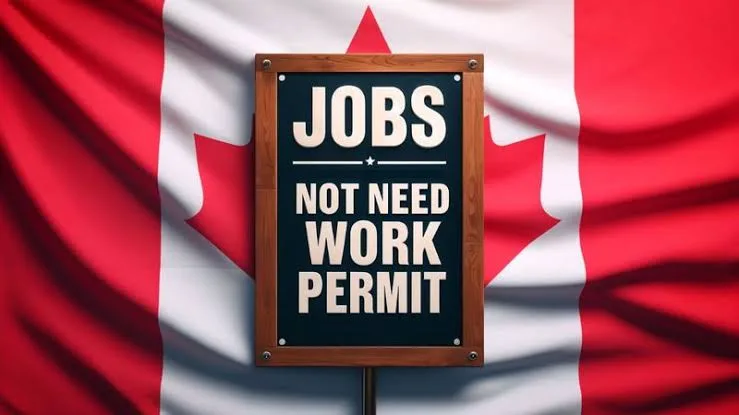
Are you looking to work in Canada without a work permit? Certain jobs in Canada are exempt from the requirement of a work permit, allowing individuals to engage in specific types of work legally. In this guide, we’ll explore 10 jobs that you can do without a work permit in Canada, providing detailed information, eligibility criteria, and resources to help you understand your options for employment.
Understanding Work Permits in Canada
If you’re considering working in Canada as a foreign national, understanding work permits is crucial. A work permit is an official document issued by Immigration, Refugees and Citizenship Canada (IRCC) that allows you to work legally in the country for a specified period.
What is a Work Permit?
A work permit is a document that authorizes an individual, who is not a Canadian citizen or permanent resident, to work in Canada temporarily. It specifies the type of work you can do, the employer you can work for, and the duration of your authorized stay in Canada. Work permits are essential for foreigners seeking employment opportunities in various sectors across the country.
Who Needs a Work Permit?
In most cases, foreign nationals who wish to work in Canada need a valid work permit. However, there are exceptions and exemptions based on specific categories, such as:
- Business visitors
- Foreign representatives and diplomats
- Performing artists and athletes
- Students with off-campus work authorization
- Spouses or common-law partners of certain work permit holders
- International Experience Canada (IEC) participants
- Provincial nominee program (PNP) nominees
- Intra-company transferees
It’s essential to determine your eligibility and the applicable work permit category based on your situation before applying.
Types of Work Permits
- Open Work Permit: Allows you to work for any employer in Canada, excluding those who don’t comply with labor laws or who offer erotic services. Open work permits are typically issued to spouses or common-law partners of skilled workers, international students, participants in specific programs, and refugee claimants.
- Employer-Specific Work Permit: Limits your employment to a specific employer and location. You need a job offer from a Canadian employer to apply for this type of work permit. Employer-specific work permits are common for skilled workers, professionals, and temporary foreign workers.
- Post-Graduation Work Permit: Available to international students who have graduated from eligible Canadian institutions and want to gain work experience in Canada. The duration of this permit depends on the length of the study program completed.
- Seasonal Agricultural Worker Program (SAWP) Permit: Allows foreign agricultural workers to work in Canada for approved employers during the agricultural season. This program is designed to address temporary labor shortages in the agricultural sector.
- International Mobility Program (IMP) Work Permit: Includes various categories such as intra-company transferees, significant benefit work permits, and reciprocal employment permits. These permits are based on international agreements, trade agreements, or specific program requirements.
How to Apply for a Work Permit
- Determine Eligibility: Review the eligibility criteria and the specific requirements for the type of work permit you’re applying for.
- Prepare Documents: Gather necessary documents, including a job offer letter, proof of qualifications, travel documents, and application forms.
- Submit Application: Submit your work permit application online or through a visa application center (VAC) if applicable. Pay the required fees and provide biometrics if needed.
- Wait for Processing: Wait for your application to be processed by IRCC. Processing times vary depending on the type of work permit and the volume of applications.
- Receive Decision: Once your application is processed, you’ll receive a decision on your work permit. If approved, you’ll receive instructions on when and how to activate your work permit.
Important Considerations
- Validity Period: Work permits have expiration dates, and you must stop working when your permit expires unless you apply for an extension or a new permit.
- Change of Employer: If you change employers while holding an employer-specific work permit, you may need to apply for a new permit or an amendment depending on the circumstances.
- Compliance with Conditions: Adhere to the conditions and restrictions of your work permit, such as the type of work allowed, employer obligations, and reporting requirements.
- Transition to Permanent Residency: Some work permit holders may be eligible to apply for permanent residency through pathways such as the Canadian Experience Class (CEC), Provincial Nominee Programs (PNPs), or Express Entry.
10 Jobs You Can Do Without a Work Permit in Canada
1. Agricultural Work
Individuals visiting Canada may engage in agricultural work, such as harvesting crops or tending to livestock, without a work permit under certain conditions. This exemption is typically limited to temporary and seasonal agricultural work.
2. Volunteer Work
Volunteering for charitable or non-profit organizations is generally permitted without a work permit, as long as the individual is not receiving remuneration or compensation for their services.
3. Business Visitors
Business visitors, such as consultants, negotiators, and researchers, may conduct business activities in Canada without a work permit, provided their primary source of income is outside Canada.
4. Artists and Performers
Artists, musicians, and performers may participate in cultural events, festivals, or performances in Canada without a work permit, as long as the event is not commercial in nature and the individual is not being paid by a Canadian organization.
5. News Reporters and Media Crew
News reporters, journalists, and media crew members covering events or stories in Canada are exempt from work permits, provided they are employed by foreign media organizations and their activities are temporary.
6. Public Speakers and Lecturers
Guest speakers, lecturers, and seminar leaders invited to Canada for short-term engagements may deliver speeches or presentations without a work permit, as long as the event is not commercial in nature.
7. Athletes and Coaches
Athletes, coaches, and sports officials participating in amateur sports events or competitions in Canada do not require work permits, provided the event is not for remuneration or prizes.
8. Emergency Service Providers
Foreign emergency service providers, such as firefighters, medical personnel, and disaster relief workers, may assist in emergency situations in Canada without a work permit.
9. Clergy and Religious Workers
Clergy members, religious workers, and missionaries engaged in religious activities, such as preaching, counseling, or conducting religious ceremonies, are exempt from work permits.
10. Film and Television Crew
Foreign film and television production crews working on location in Canada may do so without work permits under certain conditions, such as short-term projects and non-commercial purposes.
Eligibility and Limitations
Eligibility Criteria
While these jobs may not require a work permit, it’s crucial to understand the specific eligibility criteria and limitations associated with each exemption. Factors such as the duration of stay, type of work, and immigration status can impact eligibility.
Limitations
- Work must be temporary, non-commercial, and not displacing Canadian workers.
- Individuals must meet the criteria outlined by Immigration, Refugees and Citizenship Canada (IRCC) for each exemption.
- Some exemptions may have restrictions on the duration of stay or the nature of work permitted.
Resources
FAQ: Jobs Without a Work Permit in Canada
Q: Can I work in Canada without a work permit?
A: Certain jobs in Canada are exempt from the requirement of a work permit, allowing individuals to work temporarily under specific conditions outlined by IRCC.
Q: What are the limitations of working without a work permit in Canada?
A: Work permit exemptions are subject to specific criteria, such as the type of work, duration of stay, and immigration status. Individuals must adhere to these limitations to work legally in Canada.
Q: How do I know if I qualify for a work permit exemption in Canada?
A: Review the eligibility criteria and guidelines provided by IRCC for each exemption category. Consult with immigration professionals or legal experts for personalized guidance.
Q: Can work permit exemptions lead to permanent residency in Canada?
A: Work permit exemptions are generally temporary and do not automatically lead to permanent residency. Individuals interested in permanent residency should explore immigration pathways separate from work permit exemptions.
Q: Are there resources to help me navigate work permit exemptions in Canada?
A: Yes, IRCC provides information, guidelines, and resources related to work permit exemptions on their official website. Additionally, immigration consultants and legal advisors can offer assistance.
Final Thoughts
Understanding the jobs you can do without a work permit in Canada provides valuable insights into temporary work opportunities and legal requirements for employment. Whether you’re exploring volunteer work, cultural activities, or short-term engagements, knowing your options can enhance your experience in Canada and contribute positively to your career goals. Always ensure compliance with immigration regulations and seek professional advice when needed.






